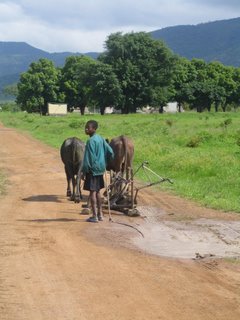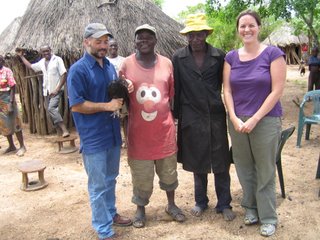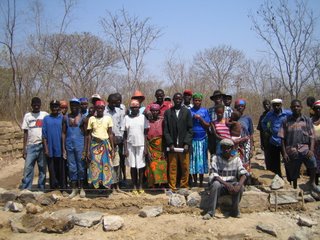
This was written on a water tank on the outskirts of Cubal, a rural municipality where I spent last week. I was there with an Angolan colleague, Pedro, and an American visitor, David. We were there to carry out a series of conversations as part of CDA’s Listening Project. CDA, based out of Cambridge, MA is conducting a 20 country study of the distribution of aid during conflicts. This Listening Project is based on the radical idea that aid organizations should ask recipients and non-recipients about the distribution of aid: how was it carried out? Did you get what you were supposed to? And so on…
We were the coordinating agency here in Angola; two other international NGOs participated. After a day of training, David, Pedro and I headed out to Cubal, where we would be carrying out these “conversations.” Since this is a qualitative project, we didn’t have a questionnaire to work from; we were just supposed to start talking to people and see where the conversation took us- always keeping on the subject of aid and community needs. A major worry was that people would think we were doing an assessment to see what type of project to support in the community- as such, we had to be very careful about describing what we were doing and what we could give them. (We could only give them an opportunity to speak their mind.) Personally, I wasn’t sure how we would be received. My previous experience of visiting aldeias (villages) was great, but that was because I was attached to a very real mill project and wasn’t asking them about the most vicious parts of their lives. We didn’t want to go into communities and do further harm, so we had to be careful. In all, we visited 13 communities and spoke with about 150 people there. I learned a tremendous amount in the week I spent in Cubal. Some of the highlights and more memorable experiences I’ll detail here. I’ll talk about the second part of the project, work done in Luanda, in the next few postings.
Ussollo, Caimbamo Municipality
The road to Cubal is atrocious. It is by far the worst I have seen in my travels, the worst I have seen in Angola. The roadsides are marked by bombed-out tanks and trucks that were casualties of the war. The road was once paved, but after years of tanks rolling down them and no effort to repair them there are potholes the size of swimming pools and kids jumping around on the tanks. We would often drive in the ditches next to the road, which was disconcerting when we would pass the land-mine warning signs.
After two hours, we were ready to break so we stopped and decided to hold our first conversation. The village, Ussollo, consisted of approximately 12 families, living in mud and straw huts. We all sat under the shady tree and began the conversation with an elderly man (the soba, or village leader usually the oldest man in the community) and two women. Soon we were surrounded by the entire village. We were lucky in that many people spoke Portuguese, so we didn’t have to rely on Pedro for translation to/from Umbundu except for the elders.
These people were internally displaced people (IDPs), from other provinces in Angola. Generally, IDPs in Angola were forced to flee the fighting during the war and seek refuge in safer cities. These people were from Huambo and Bié province, some of the most ravaged by the 27 year long civil war. Interestingly, when we asked the oldest man present to tell us about his life before the war and his life know, he spoke glowingly of colonial times. He said, “No one was killing us, we had food. The Portuguese taught us many things. Then the war took it all away and we lost our families.” This is not to say that they Portuguese were in any way benign colonizers, but compared to what they lived in the war and are living know, this gentleman thought it was the preferential option.
As we would hear in other conversations, people have not been able to recuperate what they lost in the war and feel as if they are constantly struggling to survive. This community, like others we talked to, relies almost entirely on subsistence agriculture and charcoal production. They grow just enough food to survive- mind you, just corn and many a few onions or peppers, nothing fancy like tomatoes or fruit. (They do have mangoes and bananas, which are easily found in nature here.) Charcoal production is grueling work which is no compensated monetarily. They must go into the forest (invariably further and further away as time goes on because nothing is left after trees are cut) and find the right type of young tree. They then cut the tree, haul it back, and begin the process of making charcoal. They then sell it on the side of the road or in a market in the cities. It’s in no way lucrative, but people feel that they have no other option to get a few Kuanzas for their families.
They also talked about why they can’t go home. Firstly, they simply cannot afford to relocate: there’s the transportation, the purchase of new household items, etc. Secondly, they think people are living on their lands. Many people would squat on abandoned lands and occupy houses as they came across them. Thirdly, they are afraid of the elections. The most violent phase of the war came after the elections in 1992, so many people associate elections with violence and war. Because the current government has yet to set a date for elections (they were supposed to happen in 2005), many people are waiting until they happen so they can see if it is safe. They simply don’t trust the current peace and elections.
Like many people in this area, they received emergency food aid during the war. They stated that without this help, they would have surely starved. Their complaints were that the aid simply stopped without any explanation as to why. They also describe some of the problems the aid caused in their community. A neighboring community was not receiving aid and got jealous of them. So then the community members left to go to the distribution center, the neighboring community came and stole their goats. Other people were assaulted on the way back from the center and lost the aid they had just received.
Peas
One thing everyone in the Cubal area received was peas: good old American peas sent by the US of A. Peas are not native to Angola, so people just didn’t know what to do with them. Once they learned what to do with them, they liked them.
Tchimbinga, Panda Village
The coping strategies in this community really interested me. The community was remote, and upon first glance quite poor. There wasn’t a tree within miles, making work in the sun horrible and exhausting. When we approached the community, we suddenly saw several heads of cattle, around 25. (Wealth in many of these places is determined by the number of cattle you have. If you have a bull you can work your fields much more efficiently and with a cow you have free milk.) The woman described an interesting lending mechanism that brought young people to the city. A family or rich person in the community lends a young person money to pay for transportation to the city (around Kz. 200, or US$2.50) and money for housing. The young person works until he can save money for a cow, which he buys and sends home to his family. He then works to pay off the loan and have return fare. The interest on these loans was about 50%. The woman said that these types of trips brought a lot of good things into the community but that there weren’t enough rich people around to lend the US$50 for all this. I smell a microcredit project!
Panda Centro, Panda Village
This village described an interesting trading system. They appreciated the food aid, but they received more oil than they did other things. They had all this oil, but no food to cook it in! There was a praça (market) where many UNITA (rebel party) people and others would trade/buy things. The UNITA people, who were living in the forests, had food and wanted clothes. The community people had things like oil. They would go to the city and take the oil and sell/trade it for clothes. They then would trade this clothing for UNITA’s food. This lasted from1997-1999 until the oil aid stopped.
This community returned to the village before the end of the war. We hadn’t heard of a lot of people returning before the end of the war, so we explored this a bit. They said that by this point, the war was only for those with resources. Since they had nothing, they had nothing to lose and went home. They would pay off both sides of the war (with food or animals like hens or goats) to leave them alone.
In appreaciation of our visit, they have us three cans of Coke. No potable water in this community, but plenty of Coca-Cola.
Alto Cubal
This community spoke a lot about a current Food for Work (FFW) program led by GTZ, the German development agency. The FFW program there is repairing the road leading out of Cubal- in other words, back-breaking work under the hot sun. According to one man working on the program, they received 1 50 kg sack of corn, 4 L of oil, and 2 kg of salt for three months of work. That totals about US$10 for three months of work. I hope the man was wrong. That is nothing, even for Angola. Either GTZ is the worst aid agency around or there is some corruption somewhere along the line. The man said the work was insulting, but that it was work, and there are no other jobs around. Sure enough, we couldn’t find anyone else who was lucky enough to get on the FFW program and those we spoke with said they would take it even at that miserable pay (“miserable pay” is their term, not mine).
Ngolo: “USA- União Sovietica Americana”

One of the richest communities we visited in terms of information was Ngolo. The community members weren’t at all afraid to express their opinions and once we got them started, they wouldn’t stop. One man (seen here in the Veggie Tales shirt) spoke passionately about theft of aid. In one neighboring community, everyone received 2 cans of oil, whereas in their community and and another one, they only received one can. He traveled to Cubal frequently and went to complain at the distribution warehouse, where he saw row upon row of cans of oil, with, as he put it, “USA written on them; ‘the Soviet Union of America’.” (In Portuguese, Soviet Union of America spells “USA”.) He never got an explanation of why there was so much oil sitting around when his community needed it.
This was a central theme in all of the conversations: communication. Perhaps there was a good reason that the oil in that warehouse was there: maybe stockpiling until the next distribution, or they were expired or spoiled. But this man left thinking that the agency’s employees were criminals who stole the oil and sold it for profit. Certainly, this is a possibility- these commodities were worth big money in a time where they were the only things flowing into these war-torn cities. But more likely (the optimist in me says), they were sitting there waiting to be distributed. But no one bothered to explain it to him. This came up all to often: communities left waiting for the next food distribution, only to find out 4 months later that they agency stopped with program without telling anyone; agencies not asking communities what type of hoes they used and giving them hoes that broke as soon as they hit the ground; etc.
We had a great conversation with the people in this community; as a result they tried to give us a chicken. We couldn’t take it because we were flying to Luanda the next day, but a chicken is such a nice thing to give (like I said, animals are investments and represent money down the line) and refusing a gift can be insulting if not explained properly. I explained that we were going to Luanda and they don’t allow chickens on the plan (true) and they honestly got sad. So instead I offered to take a picture (above) of all of us with the chicken so that we could always remember then and the chicken. They LOVED that idea and really flipped out when I showed them the images on my digital camera.
Kalumwe, Puhona Village: “Catchindele, catchindele!”
Women were present in many of our conversations but many times kept quiet due to machismo or patriarchal reasons. Pedro, David and I really felt the absence of women’s voices and ideas in the conversations, so we tried to find a group of only women to speak with. We stopped next to a village to eat lunch and noticed that there were only kids around, not adults. Pedro said that usually when kids are alone like that, the women are off working. As we approached the village, the kids immediately ran off, screaming, “Catchindele, catchindele!” which, in Umbundu, means “White people! White people!”  Sure enough, the women were pounding corn into fuba, corn meal (seen here). They were kind enough to take a few minutes out of the process to talk to us. This women-only conversation was much different than the other ones. They immediately told us that the real needs in the community were schools and hospitals; in other places, the men had told us that the real needs in the community were bulls and tractors. When we asked why they thought that men and women said such different things, they burst out laughing and said that men only liked thinking about themselves.
Sure enough, the women were pounding corn into fuba, corn meal (seen here). They were kind enough to take a few minutes out of the process to talk to us. This women-only conversation was much different than the other ones. They immediately told us that the real needs in the community were schools and hospitals; in other places, the men had told us that the real needs in the community were bulls and tractors. When we asked why they thought that men and women said such different things, they burst out laughing and said that men only liked thinking about themselves.
These women were smart cookies. They mentioned that their names were the ones that were on the distribution cards. This varied among communities, but most places both mothers’ and fathers’ names were on the cards. I asked why their names only were on the card, and again bursting out laughing, they said, “We know our husbands! There was a bar set up right next to the food distribution center. We only used the men to carry the food home.”













